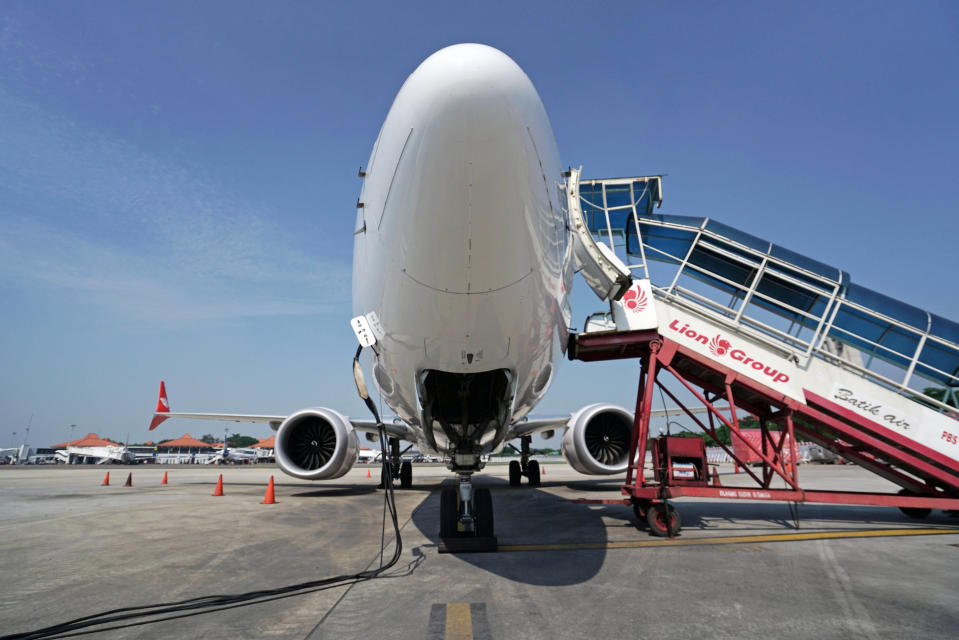Boeing 737 Max groundings mean U.S. economic data will 'be under added pressure': Wells Fargo
The global grounding of the 737 Max aircraft isn’t just bad news for Boeing (BA) – it’s likely to weigh on key metrics of the health of the U.S. economy as well, according to a new report from Wells Fargo Securities.
Boeing has more than 5,000 orders booked for the 737-Max, including 376 deliveries. In the event that some of these orders get rolled back, expect to see overall U.S. durable goods orders take a hit, said Tim Quinlan, Wells Fargo Securities senior economist.
“If some of those orders were to be canceled, the Commerce Department would subtract them from the headline figure in the month in which they occur for the durable goods report,” Quinlan said, citing discussions with Commerce Department staff.
The Commerce Department’s advanced reading for January – which was released on delay Wednesday due to the partial government shutdown – showed that headline durable goods orders rose 0.4% for the month, better than the 0.4% decline expected and marking the third consecutive month of an increase. Orders for commercial aircraft led the increase, with the segment surging 15.9% month-over-month.
“That will not be sustained, not least because of the uncertainty generated by the grounding of 737 Max planes around the world,” Michael Pearce, senior U.S. economist for Capital Economics, wrote in a note Wednesday.
While Wells Fargo did not provide a specific numerical estimate for the impact to durable goods orders, the firm highlighted the heavy weighing of the 737 Max both for Boeing’s order book and for the aircraft category within the Commerce Department’s report.
Orders for the 737 Max have accounted for about 47.1% of Boeing’s bookings since 2016, according to Wells Fargo’s analysis.
Within the Commerce Department report, aircraft orders – which tend to be highly volatile on on a month-to-month basis – made up just under a tenth of total durable goods orders over the past year, the firm estimates. The readings on durable goods orders, in conjunction with other results measuring certain capital goods orders and shipments, provides a gauge of business investment and future growth.
“Considering the 737-Max aircraft comprises almost half of Boeing’s orders in the past few years the total negative impact to durables could be substantial if airlines hold off on new 737-Max orders the next few months,” Quinlan said.
A spokesperson for the Commerce Department was not immediately available for comment.
Potential cancellations
Boeing’s global 737 Max fleet has been grounded since earlier this week in the wake of a deadly crash of Ethiopian Airlines flight 302 on Sunday, which took the lives of all 157 people on board. This marked the second deadly crash of a 737 Max 8 plane in five months. The investigation into the cause of the Ethiopian Airlines crash is ongoing.
The aerospace giant earlier this week also halted deliveries of the 737 Max plane, but will continue with production of 737 jets at the current rate.
Despite the operational road bumps – which have already taken a toll on airlines whose fleets include numerous 737 Max jets – Boeing is not likely to face significant cancellations from its existing customers, Quinlan asserted.
“Cancellations tend to incur hefty penalties, and Boeing is working on a fix for the issue at hand,” Quinlan said. “In addition, multi-year backlogs at Airbus leave airlines looking to expand or upgrade aging fleets few alternatives.”

Quinlan drew parallels to the three-month grounding of Boeing’s 787 Dreamliner in 2013 after battery problems were linked to fires aboard the aircraft. During that incident, orders still came in during the grounding period, “and the Dreamliner has subsequently seen steady sales volume,” Quinlan added.
Some airlines have reportedly begun to mull cancellations for orders of the 737 Max, however. Bloomberg reported earlier this week that Indonesian airlines Garuda Indonesia and Lion Air are considering dropping orders for the 737 Max, and Russian airline Utair is seeking guarantees from the company before proceeding with deliveries.
U.S. airlines have not yet signaled plans to modify current or future orders of Boeing’s aircraft. However, if some of Boeing’s preexisting deliveries were suspended, it would weigh on domestic capital expenditures “as early as the current quarter,” Quinlan said.
“The 737-Max aircraft averaged roughly 40% of aircraft deliveries in the past three months,” he said. “With fewer aircraft being shipped until the issue is resolved, we see some risk to our near-term outlook for equipment spending.”
—
Emily McCormick is a reporter for Yahoo Finance. Follow her on Twitter: @emily_mcck
Follow Yahoo Finance on Twitter, Facebook, Instagram, Flipboard, LinkedIn, and reddit.
Read more from Emily:
What Wall Street strategists forecast for the S&P 500 in 2019
Beer sales are lukewarm and pot could be part of the problem
Consumer sentiment plunges to its lowest level since Trump’s election